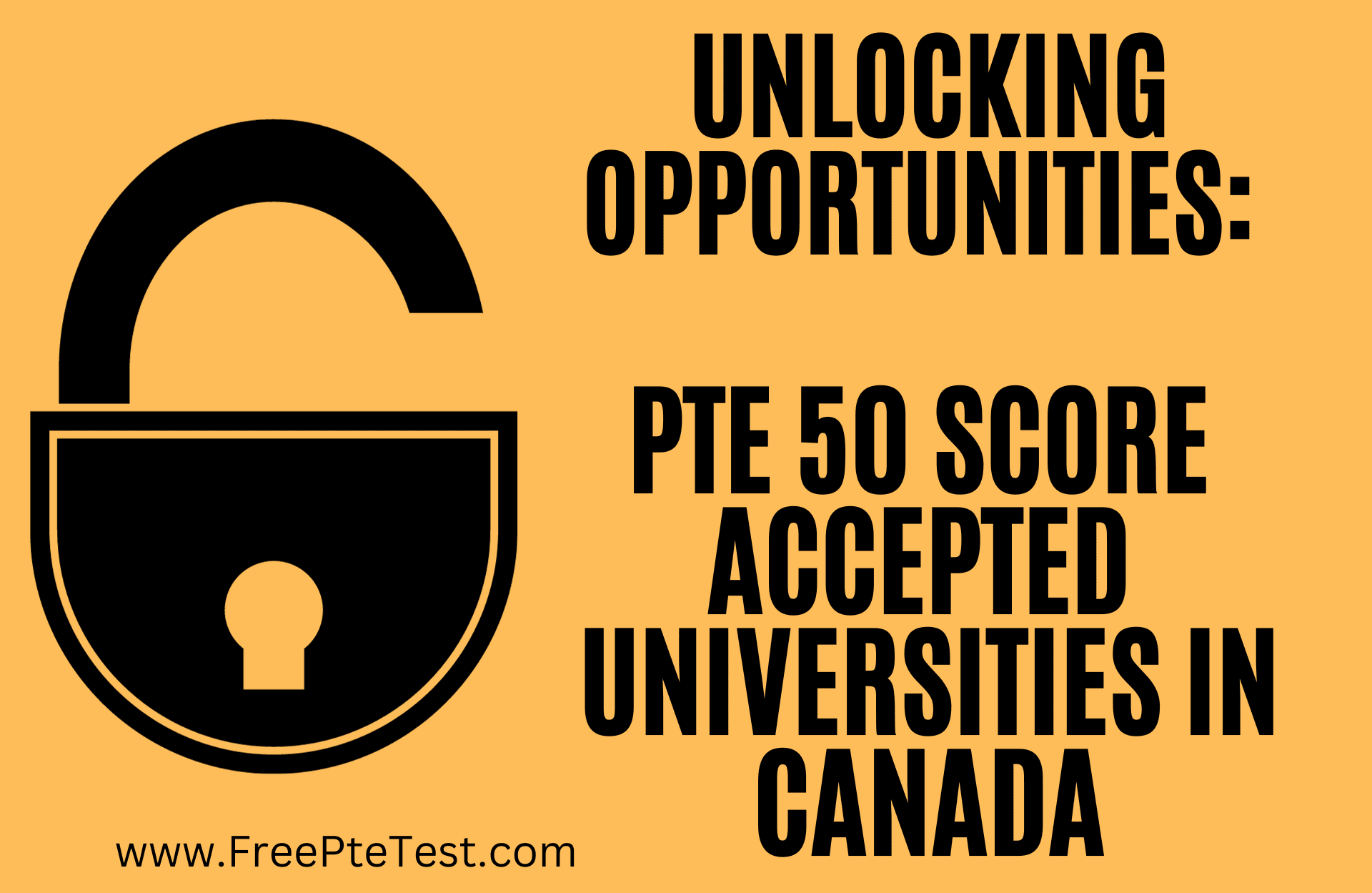PTE 50 Score Accepted Universities in Canada: As the pursuit of higher education becomes increasingly globalized, Canada has emerged as a top destination for students seeking quality education in a diverse and welcoming environment.
One of the essential elements in the journey of studying abroad is meeting the language proficiency requirements. While the International English Language Testing System (IELTS) and Test of English as a Foreign Language (TOEFL) are commonly accepted, the Pearson Test of English (PTE) is gaining popularity, and students with a PTE score of 50 are finding doors open to a variety of Canadian universities.
Why PTE and a Score of 50?
The Pearson Test of English is a computer-based English language proficiency exam designed to assess a candidate’s skills in listening, reading, speaking, and writing. Recognized globally, PTE offers a fair and unbiased evaluation of a candidate’s English language abilities.
A score of 50 in PTE indicates an intermediate level of proficiency, demonstrating that the test-taker has a good command of the English language, making them capable of successfully pursuing academic studies.
Acceptance of PTE 50 Scores in Canadian Universities:
Many Canadian universities understand the diverse backgrounds and language proficiency levels of international students. To attract a broader range of talent, several institutions have started accepting PTE scores as part of their admission criteria.
A PTE score of 50 is often considered equivalent to other standardized English proficiency tests, making it a viable option for prospective students.
Benefits of Studying in Canada:
Before delving into the list of universities accepting PTE 50 scores, it’s crucial to understand why Canada is an attractive destination for international students.
Canada boasts a high standard of living, a diverse and inclusive society, and a world-class education system. Moreover, international students in Canada can enjoy the opportunity to work part-time during their studies and gain valuable work experience through post-graduation work permits.
List of Canadian Universities Accepting PTE 50 Scores:
University of Toronto:
The University of Toronto, consistently ranked among the top universities globally, accepts PTE scores, including a score of 50, for admission to various undergraduate and graduate programs.
University of British Columbia (UBC):
UBC, located in Vancouver, one of the most beautiful cities in the world, recognizes the value of diverse language proficiency tests, including PTE. A score of 50 in PTE is considered for admission.
University of Alberta:
The University of Alberta, renowned for its research contributions, is welcoming students with a PTE score of 50 to join its academic community.
McGill University:
Situated in the vibrant city of Montreal, McGill University has a reputation for academic excellence and multiculturalism. It considers PTE scores as part of its admission process.
University of Waterloo:
Known for its co-operative education programs and strong focus on innovation, the University of Waterloo embraces the diversity of its student body, accepting PTE scores for admission.
University of Calgary:
The University of Calgary, located in the dynamic city of Calgary, Alberta, recognizes PTE as a valid measure of English proficiency, with a score of 50 being acceptable for admission.
Simon Fraser University (SFU):
SFU, situated in Burnaby, British Columbia, is committed to providing a supportive and inclusive learning environment. The university accepts PTE scores, and a score of 50 is considered for admission.
University of Ottawa:
As a bilingual institution in Canada’s capital, the University of Ottawa recognizes the importance of English proficiency. PTE scores, including a score of 50, are accepted for admission to its programs.
Conclusion:
In conclusion, the acceptance of PTE 50 scores by Canadian universities opens up new possibilities for international students seeking quality education in a diverse and inclusive environment. The universities mentioned above are just a few examples of institutions that value the diverse linguistic backgrounds of their prospective students.
As the educational landscape continues to evolve, it is likely that more Canadian universities will embrace alternative measures of English proficiency, making the dream of studying in Canada more accessible to a broader range of students.
Prospective students should keep in mind that admission criteria may vary across programs and faculties within each university.
It is advisable to check with the specific department or admissions office of the chosen university for the most accurate and up-to-date information regarding English language proficiency requirements. With determination, preparation, and a PTE score of 50, the doors to Canadian universities are wide open for those ready to embark on a transformative educational journey.
FAQs on Universities in Canada:
Q1: What is the Pearson Test of English (PTE)?
The Pearson Test of English (PTE) is a computer-based English language proficiency test that assesses a candidate’s skills in listening, reading, speaking, and writing. It is recognized globally and is commonly used for admission to academic programs and immigration purposes.
Q2: Why choose a PTE score of 50 for Canadian universities?
A PTE score of 50 is considered an intermediate level of English proficiency, demonstrating a good command of the language. Many Canadian universities recognize this score as equivalent to other standardized English proficiency tests, making it a viable option for international students seeking admission.
Q3: How does a PTE score of 50 compare to other English proficiency tests?
Different English proficiency tests, such as IELTS and TOEFL, have their scoring systems. A PTE score of 50 is generally considered equivalent to a certain level of proficiency in these tests. It’s important to check with individual universities for their specific conversion scales and requirements.
Q4: Can I apply to any program with a PTE score of 50 in Canada?
While a PTE score of 50 is accepted by many universities in Canada, the specific admission requirements may vary by program and faculty. Some programs may have higher language proficiency requirements, so it’s crucial to check with the respective department or admissions office for accurate information.
Q5: Are there any additional requirements for international students applying with a PTE score of 50?
Apart from English proficiency, international students typically need to meet other admission requirements, such as academic qualifications, letters of recommendation, and a statement of purpose. Visa requirements and financial documentation may also apply.
Q6: How can I prepare for the PTE to achieve a score of 50 or higher?
Preparation is key to success in any proficiency test. Consider enrolling in PTE preparation courses, using official PTE study materials, practicing with sample tests, and focusing on improving your skills in listening, reading, speaking, and writing.
Q7: Can I improve my PTE score after taking the test?
Yes, it is possible to improve your PTE score by dedicating time to targeted practice and identifying areas for improvement. However, it’s important to note that test scores are a reflection of your current proficiency level, and improvement may vary from individual to individual.
Q8: Are there scholarships available for international students with a PTE score of 50?
Scholarships and financial aid opportunities vary by university and program. Some institutions may offer scholarships based on academic merit, while others may consider a combination of factors, including English proficiency. It’s advisable to explore scholarship options offered by individual universities.
Q9: Can I work while studying in Canada with a PTE score of 50?
However, specific regulations may vary, and it’s essential to familiarize yourself with the work permit conditions and immigration policies in Canada.
Q10: Are there any English language proficiency tests other than PTE that Canadian universities accept?
Yes, Canadian universities commonly accept other English language proficiency tests, such as IELTS and TOEFL. The acceptance criteria may vary, so it’s important to check the specific requirements of the chosen university and program.



